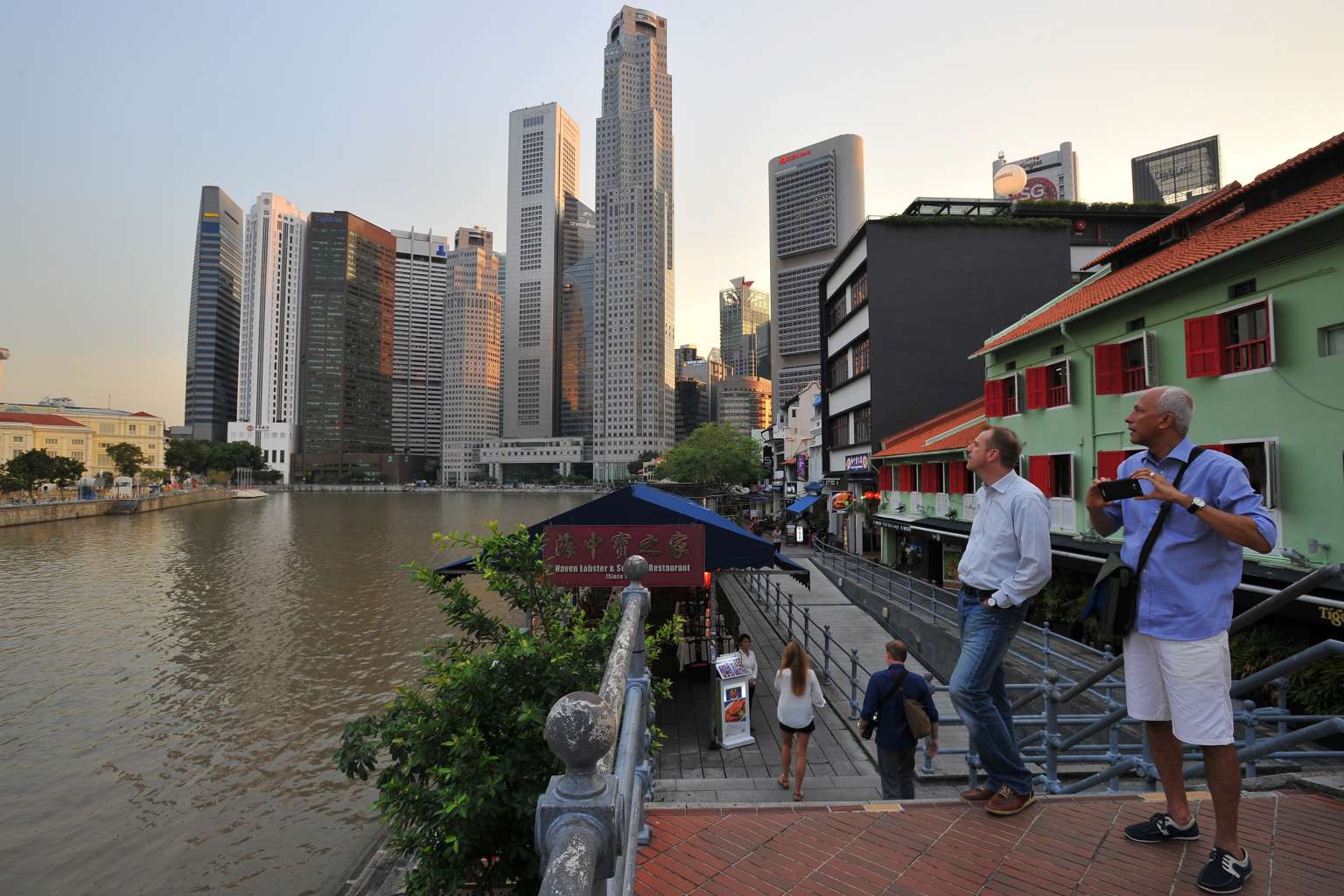Singapore wants business travellers to have fun - and spend more
Sign up now: Get ST's newsletters delivered to your inbox

Tourists taking in the sights at Boat Quay. Singapore Tourism Board wants to entice business travellers in Singapore to spend more.
PHOTO: LIM YAOHUI FOR THE STRAITS TIMES
Follow topic:
SINGAPORE (BLOOMBERG) - The lone business traveller has a typically sad routine: Finish with meetings, head back to the hotel, fire up the laptop and work while ordering room service. The tourism chief of Lonely Planet's No. 1 destination says the challenge is getting them out to spend more.
"How do we entice them to think about some kind of programme after the work is done, restaurants to go to, or places of attraction to visit," said Mr Lionel Yeo, chief executive officer of the Singapore Tourism Board (STB). "We have to see what the touch points are."
That effort is getting some help: Singapore will become the first South-east Asian city to get its own Michelin Guide in 2016.
Celebrity chef Gordon Ramsay this year opened a restaurant at Marina Bay Sands, which houses a casino, hotel and a convention centre. The Republic has been seeking international events, and will in February bring back the Singapore Airshow, which attracted more than 146,000 visitors from 125 countries and regions in 2014.
As tepid global economic growth prompts more companies to tighten their travel budgets, Singapore is looking for new ways to boost arrivals and spending. The number of visitors peaked in 2013, following several years of growth spurred by the opening of two casino-resorts in 2010, and the city-state trimmed its 2015 growth forecast in November.
Spending by travellers in Singapore probably will not match the S$23.6 billion in 2014 because of lower spending from business visitors and gaming receipts at the island's two casinos, Mr Yeo said in a Nov 27 interview. The number of arrivals to the island city this year will remain flat at 15 million, he said.
Singapore's tourism receipts fell 12 per cent from a year earlier to S$10.5 billion in the first half, as the average occupancy rate at luxury hotels slipped almost 4 per cent, government data showed. The government in March cut its target of 17 million visitors and S$30 billion in tourism receipts for 2015, citing competition from rival destinations.
"When the world isn't growing as fast, when incomes aren't growing as fast or the outlook for the world becomes a little bit more gloomy, the headwinds for tourist spending will always be there," said Mr Wai Ho Leong, an economist at Barclays. "You can offset it with promotions but you should expect some loss of ground."
Still, business travel spending in the Asia-Pacific region is expected to grow four times as fast as in North America and more than double the rate in Europe between 2014 and 2018, according to a McKinsey & Co report in October commissioned by the STB. The region's business visitor spend hit US$459 billion (S$645.6 billion) in 2014, the biggest share globally at 39 per cent, according to the Global Business Travel Association.
Singapore is promoting itself as a destination for corporate incentive travel, with companies such as Los Angeles-based nutrition company Herbalife bringing about 20,000 of its sales agents to the country in 2016, said Mr Yeo, a career government official who has been with the elite administrative service since 1996.
Corporate travellers in Singapore and those in town for conferences and exhibitions tend to spend twice as much as holidaymakers, and on average they represent about a third of tourist spending, according to the city-state's tourism authority, which Mr Yeo has led since 2012.
The Government is also seeking new sporting events and concerts it could host in venues such as the National Stadium, completed in June 2014 with a maximum capacity of 55,000. Singapore is hosting the two-day Rugby Sevens tournament in April.
Casino-Spurred Growth
While the city-state has given exclusive licences to Las Vegas Sands and Genting Singapore to operate casinos until 2017, the Government is keeping all options on the table, Mr Yeo said without elaborating.
Singapore could potentially permit a third casino or more to be built, or allow the existing resorts to be expanded.
The island's economy surged by a record 15 per cent in 2010, the year it opened the doors to two multi-billion-dollar casino resorts, which spurred a 20 per cent jump in visitor arrivals. Las Vegas Sands's Marina Bay Sands houses the country's biggest hotel and convention centre, while Genting's Resorts World Sentosa operates South-east Asia's only Universal Studios theme park.
Asian casino operators have seen their takings hurt amid economic weakness in the region, while China's anti-corruption campaign prompted high-rollers from the country to lay low. In Singapore, Resorts World Sentosa's gaming revenue fell 5 per cent in the three months ended September, partially offset by a 10 per cent rise in non-gaming contributions, while sales at Marina Bay Sands rose 2 per cent.
"Gaming revenues in the short term may have come down a little bit from their initial years but I would say they are still at good levels," said Mr Yeo, referring to the two Singapore casino resorts. "What's encouraging is that their non-gaming revenues continue to grow quite well."

